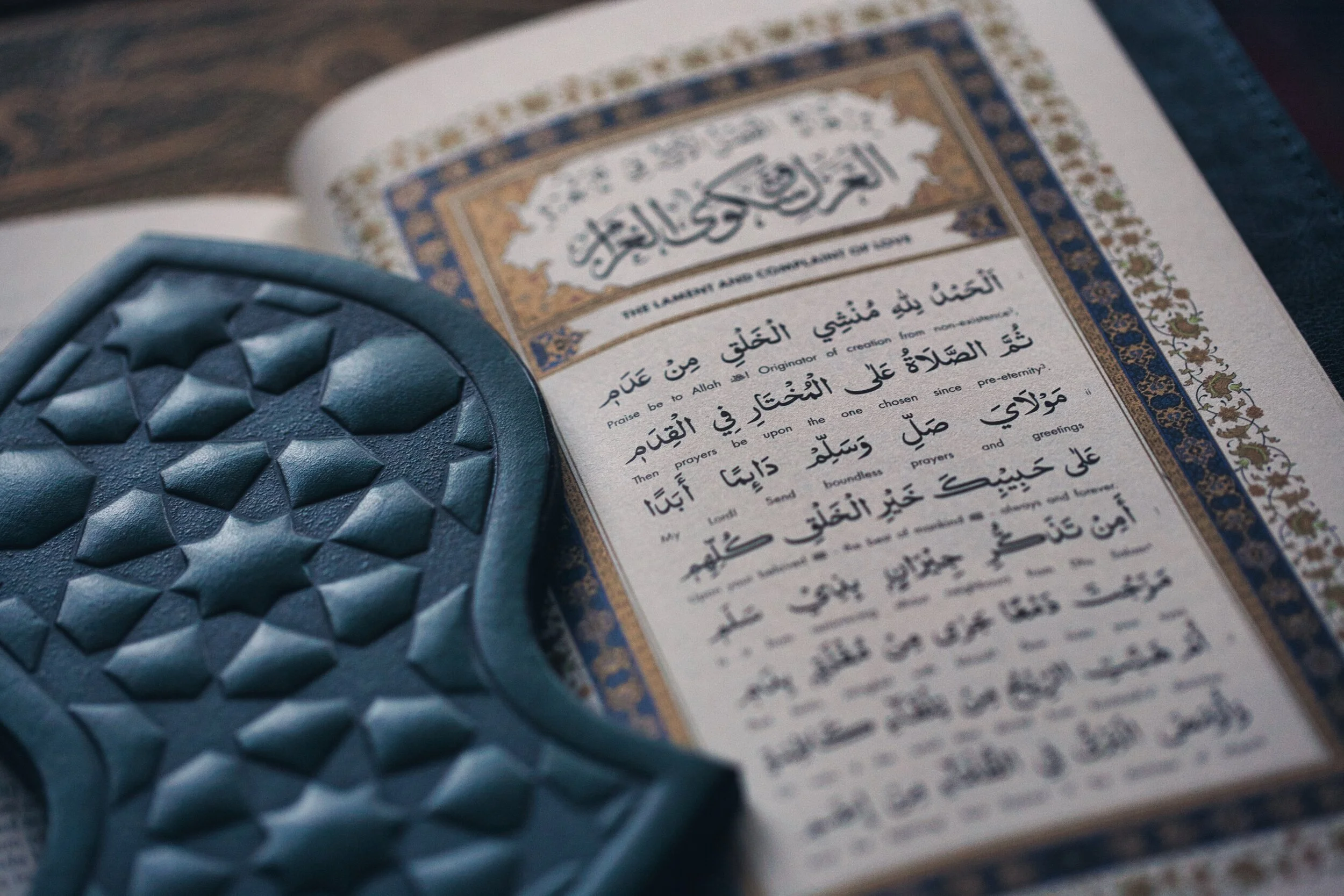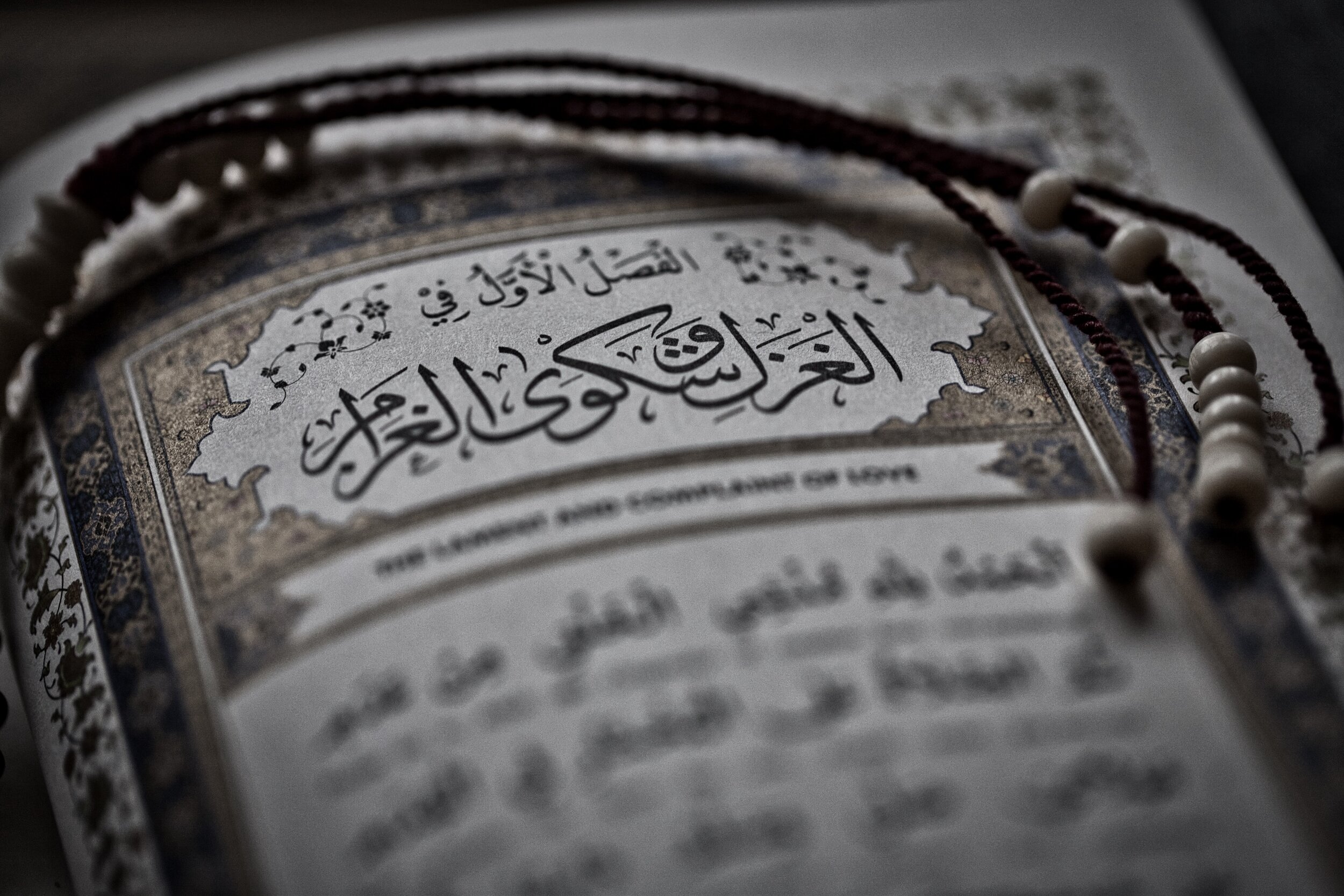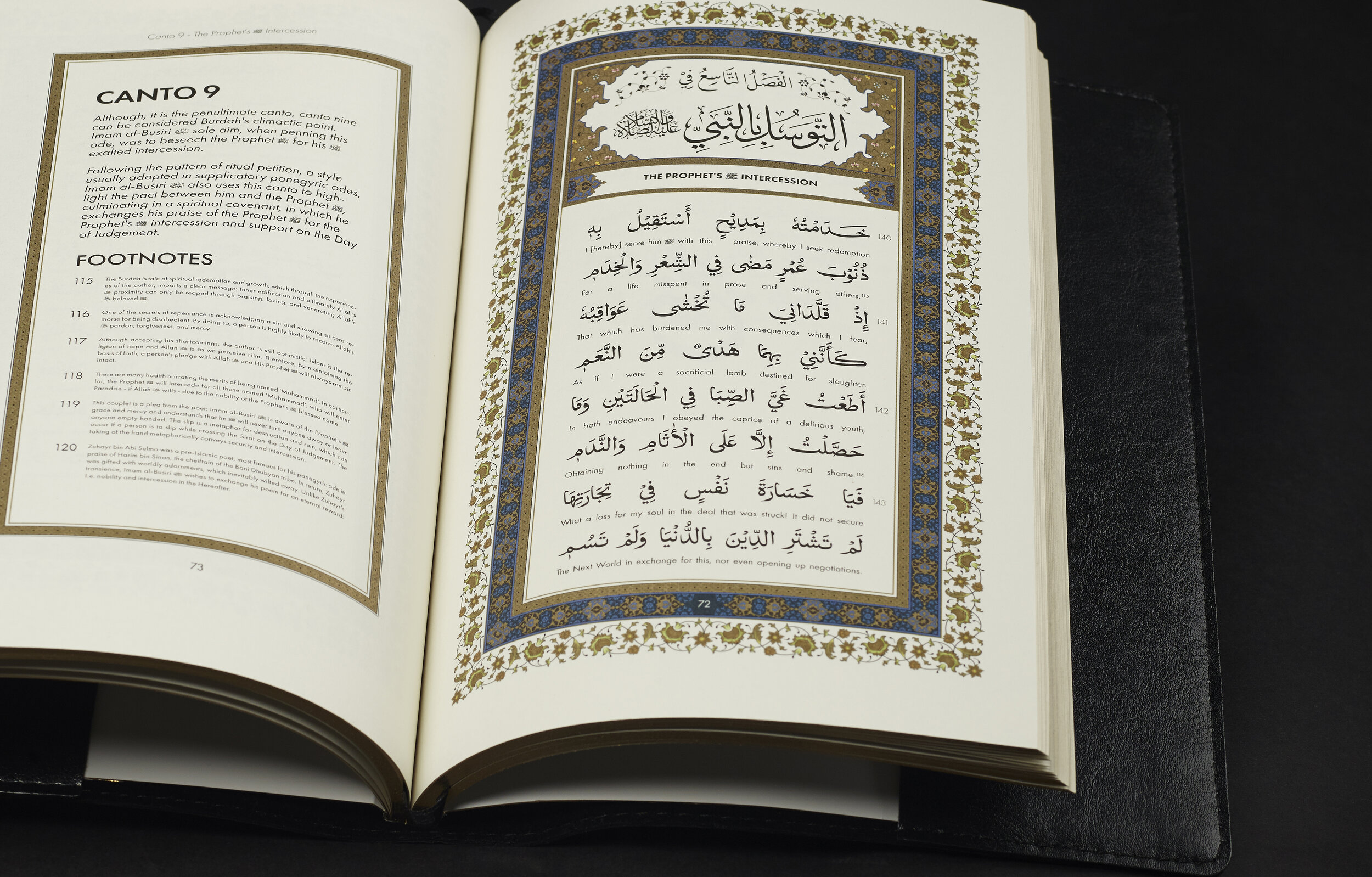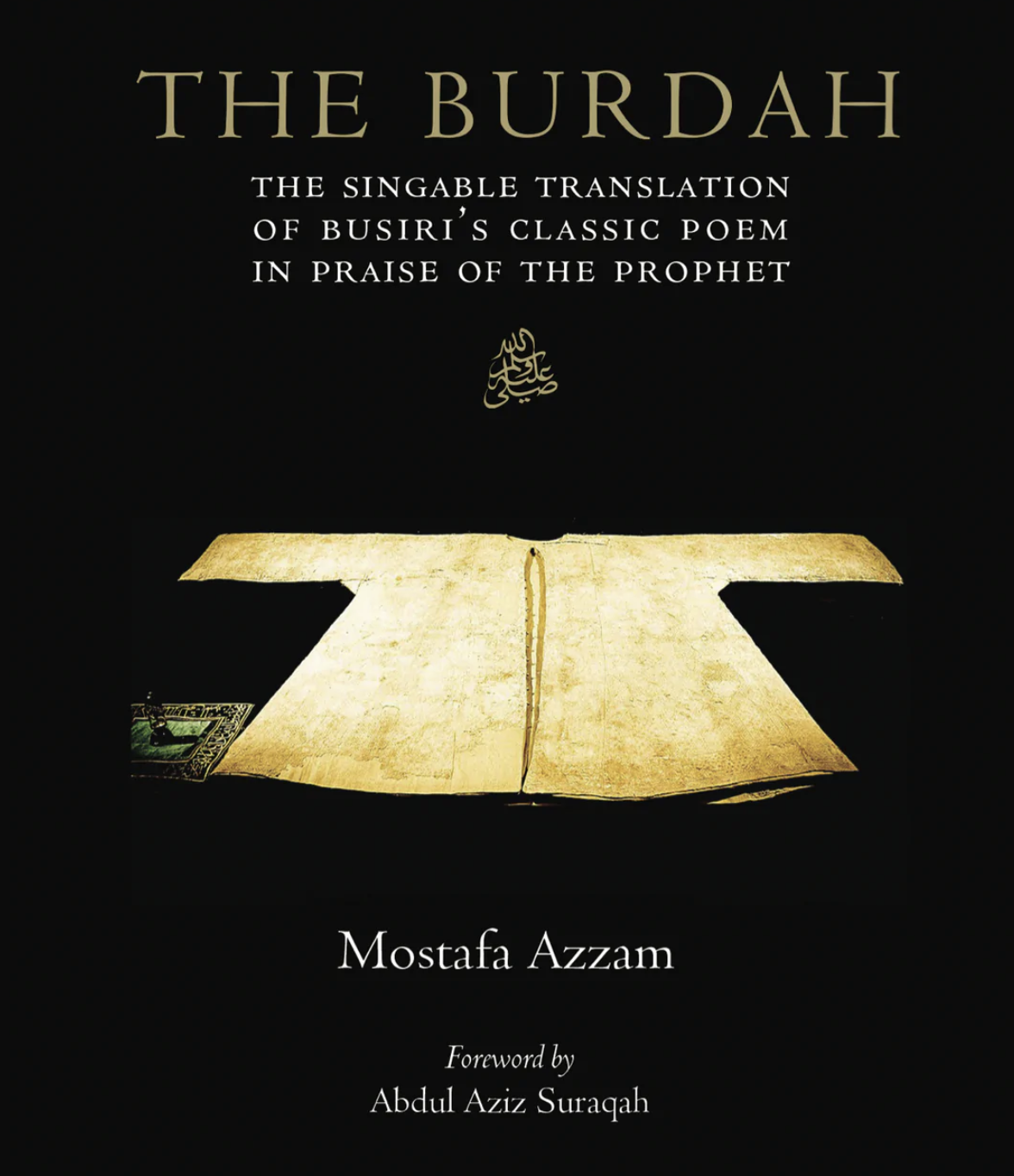The Burdah of Imam al-Busiri might be the most famous poem in the world.
Chances are, you've heard portions of this growing up or in passing. It's that famous "mawlaya salli wa sallim" nasheed so many know sing. The Burdah is a study of the seerah and spirituality all in one. It is a poem that contains many profound - even miraculous - secrets.
Today, 800 years after it was composed, this ode to the Prophet ﷺ is probably the world's most often recited poem as well.
Why?
First & foremost:
Reading, singing, & reciting the Burdah is a means for us to strengthen one’s love for the Prophet Muhammad ﷺ & connection to him. And connection to the Prophet ﷺ is, of course, one of the best means of seeking the forgiveness, mercy, & pleasure of Allah, the Most High.
How famous is the burdah?
It's hard to measure the fame of a poem.
But, consider the following:
There are well over 1 billion Muslims worldwide. And it's likely that almost all of them are familiar with the burdah.
IGI’s leather-wrapped travel edition of the Burdah is designed to be carried everywhere & read frequently.
The burdah is regularly sung in weekly, monthly, and annual gatherings across dozens of countries and a wide range of cultures. This tradition has continued for hundreds of years down to the present day. While, again, this is impossible to measure, it seems that the Burdah has gained a unique level of worldwide acceptance across language barriers and among different cultures.
This widespread appeal of the Burdah suggests that, in writing this poem, the author connected with something profound and universal.
Who was Imam al-Busiri?
Imam al-Busiri, the author of the Burdah, is less well known that his poems.
The commentators of IGI’s new edition of the Burdah observe, “Given that different biographers and historians have documented varied versions…not much is certain about Imam al-Busiri’s life.” Sources indicate the following:
Imam al-Busiri’s full name was Abu Abdullah Sharaf al-Din Muhammad ibn Sa’id al-Busiri al-Sanhaji
He was from the clan of Banu Habnum, a major branch of the North African Berber Sanhaji tribe
It is reported that Imam al-Busiri was born in 608 AH (1211 CE) and died in 691 AH (1294 CE) at the age of 83 years
Imam al-Busiri memorized the Qur’an at a young age, and moved to Cairo to pursue more advanced studies. It is said that he mastered a number of Islamic sciences, including Arabic language & grammar, linguistics, literature, Islamic history (Tariqh), Qur’anic exegesis (Tafsir), theology (‘Aqidah), logic, debate, and Prophetic biography (Seerah).
While Imam al-Busiri’s works are extremely famous, relatively little is known about the Imam himself
It is said that among Imam al-Busiri’s students were Imam Abu al-Hayyan al-Gharnati and Imam Fath al-Din ibn Sayyid al-Nas.
In the foreword to Mostafa Azzam’s singable translation of the Burdah, Abdul Aziz Suraqah writes that while in Cairo, Imam al-Busiri “earned his living writing calligraphy upon tombstones. He soon became famous in the region for his poetic prowess and lyrical skill, and was hired by some of Egypt’s government officials as a municipal clerk and court poet. His job was to write poetry in praise of the Sultan.”
A major transition in Imam al-Busiri’s life occurred when he became a student of Shaykh Abu al-Abbas al-Mursi, a teacher in the Shadhili order. At that time, Imam Abu al-Hasan al-Shadhili was still alive, and Imam al-Busiri wrote a famous eulogy for Imam al-Shadhili upon the latter’s death. Many of Imam al-Busiri’s contemporaries, who were also fellow students of Shaykh Abu al-Abbas al-Mursi, are famous to this day, including Ibn Ata’Allah al-Iskandari and Shaykh Izz al-Din ibn Abd al-Salaam.
It is said that another major catalyst for Imam al-Busiri’s spiritual growth was his Hajj, which he performed in 653 AH (1255 CE).
Imam al-Busiri’s illness
It is said that one of the secrets to the Burdah is that its author, Imam al-Busiri wrote the poem while in a state of complete brokenness & need, and utter humility before God.
The commentators of IGI’s Burdah explain:
Imam al-Busiri was already a well-known poet & scholar when he composed the Burdah
“Artists come to life when calamities call and Imam al-Busiri's greatest poem was a result of a powerful tribulation when he awoke to find he was paralyzed. Suddenly, this man - whose erudition and art had elevated him to the status of the prince of poets - was reduced to an invalid who was unable to rise from his bed. Within this state of affliction is the key to the Burdah's legacy.”
Prior to this experience, Imam al-Busiri had been a famous poet in Cairo, widely recognized by the rich & powerful of his society. He had received many accolades for his work. Yet he suddenly found himself in a situation where no one on earth, no matter how influential, could assist him in any way.
The dream of Imam al-Busiri
One version of the story, narrated with a full chain of transmission to Imam al-Busiri, is translated as follows:
“I had previously composed many poems in praise of the Messenger ﷺ; among them some that Zayn al-Din Ya’qub ibn al-Zubayr had suggested to me.
It then transpired that I was stricken with hemiplegia, which left half of my body paralysed. At this moment, I thought of composing the poem [i.e. the Burdah], and so I did. With it, I asked for intercession with Allah and for Him to forgive me.
I recited it over and over again; weeping, praying, and beseeching.”
The Imam continued in this state for some time. But one night, something miraculous occurred.
The commentators of IGI’s edition write, “It is reported that Imam al-Busiri fell asleep whilst reciting couplet eight and that during this dream, the Imam was honoured to recite the Burdah for the Prophet ﷺ.”
Couplet eight is translated as follows:
“Yes! At night, visions of my beloved manifested, depriving me of sleep;
For love often disrupts delight with pain!”
Imam al-Busiri continued to recite the poem in his dream, with the Prophet ﷺ as his audience. However, after reciting 50 verses, the Imam reached a verse which was theretofore unfinished:
“The most we know of him ﷺ is that he ﷺ is a man
And [yet, without exception] he ﷺ is the best of Allah’s creation.”
After reciting the first half of the verse, Imam al-Busiri paused.
Then, miraculously, the Prophet ﷺ himself completed the verse.
The commentators explain:
"On reaching couplet fifty-one, the imam recited the first hemistich and stopped as he had not finished the poem. Then, the most euphoric moment occurred: the Prophet ﷺ completed the couplet with the second hemistich: 'And [yet, without exception] he ﷺ is the best of Allah's creation.' Thus, showcasing the acceptance of the Burdah and its majesty.”
Due to its unique origin, the commentators note that this verse has a special status within the poem:
“Couplet fifty-one is to be recited thrice, during recitations, due to its significance."
Unique Nature of the Burdah
In one of the introductory essays of IGI's Burdah, the commentators write:
"The Burdah is a literary rarity, casting readers into another realm. Each couplet is deeply rooted in Islamic history and tradition; symbolising Islam's universal message of love, peace, and diversity by contextualizing the importance of the Prophet Muhammad ﷺ, whose mercy, compassion, kindness, and perfect character is the moral compass of all Muslims."
Many people read the Burdah frequently, often as part of a daily routine of dhikr
The commentators & editors of this edition also put extensive efforts into the book’s design. Every detail of this edition is designed to help you read, study, & engage with this blessed poem. The original Arabic text is printed in beautifully ornamented, easy-to read Nakhshi script, arranged alongside a meticulously reviewed English translation. This edition also includes over 100 footnotes, as well as extensive commentary drawing on dozens of traditional sources. The text is also printed on a high-grade paper, which has special properties designed to endure regular or daily reading over a long period of time.
In short, this a book designed to be read frequently.
And many, many people do read the Burdah frequently.
In the introduction to Ustadh Mostafa Azzam's unique rhyming English translation of the Burdah, Abdul Aziz Suraqah writes:
"[The Burdah] is meant to be engaged with: to be experienced not only by the eyes that read it, but also by the voices that sing it and the ears that hear it. Celebrating the Prophet Muhammad ﷺ is not a spectator sport or a performance to be watched and appreciated from afar. It is an expression of love, or a conscious effort to open one’s self up to love and receive it."
The leather wrap case of IGI’s Burdah makes is suitable for travel
Like any literary masterpiece, the Burdah contains many layers of meaning that continue to reveal themselves with each reading.
Among them are a number of unique prayers.
Prayers within the Burdah
The commentators of the IGI Burdah mention many unique benefits & blessings contained within specific verses of the poem.
For example, couplet thirty-seven:
“To Allah was his ﷺ call; thus, whomever holds fast to him ﷺ
Clings to a rope that will never break.”
The editors mention this couplet can strengthen the faith of the one who recites it.
Regarding the following verse, which refers to the Companions رضي الله عنهم:
“[The companions] were mountains, just ask those who accosted them
What it is they witnessed on the battlefield.”
Traditionally, this verse was known to be a sort of du'a for protection of one's home & property.
Another verse is considered to provide protection for travelers:
“Never did I suffer injustice when seeking his ﷺ protection,
But that I was never oppressed, nor harmed”
This verse is particularly recommended for those traveling on a long or potentially dangerous journey.
The commentators of IGI’s Burdah write the ninth chapter “can be considered the Burdah’s climactic point.”
Other verses specifically refer to one’s relationship to & loyalty to the Prophet ﷺ, and hope for his ﷺ intercession:
“Yet, despite my sins, my pact remains unbroken
With the Prophet ﷺ, and my rope remains intact.”
Regarding this verse, the commentators write, “Although accepting his shortcomings, the author is still optimistic; Islam is the religion of hope and Allah is as we perceive Him. Therefore, by maintaining the basis of faith, a person’s pledge with Allah and His Prophet ﷺ will always remain intact.”
In this spirit of hope, the Burdah concludes with this prayer for God’s forgiveness & bounty:
““Thus, this ode of the chosen one ﷺ has reached its finale
All praise is for Allah in its opening and conclusion
Its verses number one hundred and sixty
By them, alleviate us: O Master of Generosity!
[O Allah] Pardon its singers and forgive its readers
We ask You for [all] goodness, o Possessor of Munificence”
A passage from the essay "Virtues of the Burdah" provides a fitting conclusion to this introduction:
"The Burdah is a poem of hope, inspiring generation after generation. By depicting and eulogising the great example of the Prophet ﷺ, the Burdah serves as a perfect model of redemption, purification, and enlightenment, which is epitomised by its thirty-sixth couplet:
“He ﷺ is the beloved whose intercession is anticipated;
A victor against every terror and calamity.”
For 800 years, generation after generation has rediscovered the blessings and benefits of this extraordinary poem.
Etiquettes of Reciting the Burdah
The recommended etiquettes, or adab, of reciting the Burdah are similar to those of any beneficial practice.
According to Imam Amr b. Ahmad al-Kharputi, these include:
Being in a state of wudu (ritual purity)
Face the qiblah
Recite with tajwid (correct elocution)
Understand the meanings of each verse
Recite melodiously
Repeat the refrain (i.e. mawla ya salli wa sallim…) after every couplet, or at least after every 10 couplets
For additional benefit, Imam al-Kharputi also recommends that the reciter should:
Have memorized the entire poem
Have ‘ijaza (permission) in any from to recite the entire poem, from an authority or teacher who has a direct sanad (chain of transmission) to Imam al-Busiri and the poem
Perhaps most of all, it is beneficial to approach the poem in a state of profound need and brokenness before Allah. In the introduction to his rhyming translation of the Burdah, Ustadh Mostafa Azzam writes:
“...the Burdah is a poem of hope. One of the many beautiful things about Imam Busiri’s Qasidat al-Burdah is the broken state in which he presents it, making no claims to loftiness. Because the Burdah is not just for the saint and the scholar; the Burdah is for saint and sinner alike, for scholar and layman alike. It is a poem that allows every single one of us to say with our state:
Lord, my hope in You is not through my deeds;
My hope in You is through the Chosen One.
I come to You with grave sins on my back;
But with Muhammad upon my tongue
Salla Llahu ‘alayhi wa alihi wa sahbihi wa sallama tasliman kathira”
For further discussion of what he calls “the journey of the Burdah,” see Ustadh Mostafa’s ongoing series of lectures on IGI’s YouTube.
We hope this essay inspires you to reconnect with the Burdah, or to explore it for the first time.
Once again, the recitation of this poem is not meant to be a “spectator sport,” but a community activity!
The Burdah Around The World
The Burdah is indeed a central feature of community gatherings around the world. The poem is sung and recited in a vast range of cultures, and distinctive renditions of the Burdah have developed in many countries & regions, including:
Malaysia (Malay translation)
Saudi Arabia (with Shaykh Muhammad ‘Alawi al-Maliki in Makkah)
Kenya (1980’s recording of a gathering with Habib Ahmad Mashur al-Haddad)
Bangladesh (Bengali translation)
Japan (Japanese translation)
The above is a small sample of different versions of the Burdah, & there are many, many more. The Burdah is also often adapted into various popular music styles, (see here, here, & here).
This beautiful collection includes recitations of the Burdah in different styles from 15 countries across Asia & Africa
There are often different styles of recitation within each culture, and new versions continue to develop all the time. It’s almost impossible to mention all of them!
One beautiful display of this diversity is the short compilation by Al-Madina Studios, which includes recitations a few verses of the first chapter of the Burdah, collected from 15 different countries across Africa & Asia.
If you know of a beautiful version of the Burdah, particularly in a style that’s not included here, let us know in the comments!
Criticism & Defense of the Burdah
Criticism of the Burdah is a relatively recent phenomenon. Over the 800 years since the poem was composed, hundreds of classical scholars have praised the poem & written commentaries on its meanings & merits. Criticism of the Burdah is quite rare by comparison, and nearly all arguments against the Burdah have been advanced within the past 50 years.
In the video below, Shaykh Sjaad Hussein places criticisms of the Burdah within their theological and historical context, and examines arguments both for and against the poem’s position in the Muslim tradition.
May you forever increase in love for Allah and His Messenger ﷺ.
IGI’s leather-wrapped travel edition of the Burdah is a beautiful book that is designed to be carried with you and read frequently. Available in the IGI Bookstore.
IGI Patreon members get early access to as-yet-unpublished manuscripts and translations
Ustadh Mostafa Azzam’s rhyming translation of the Burdah is available as a free PDF download in the IGI Bookstore.










